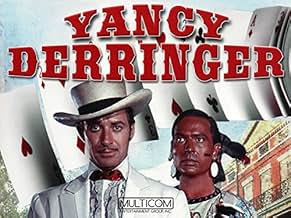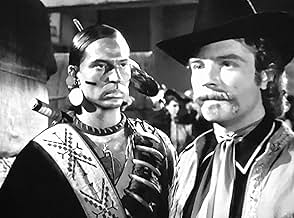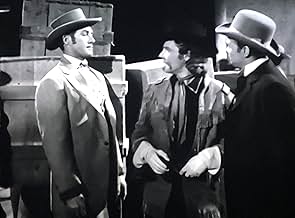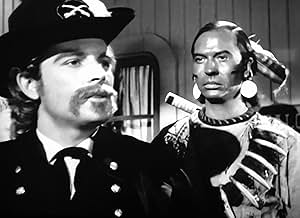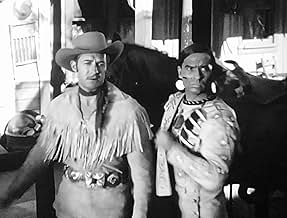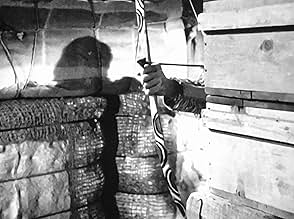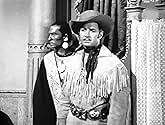An adventurer, gambler, and widely respected southern gentleman is recruited to work as a secret agent, at no pay, in post-Civil War New Orleans, helped by his companion, a silent Pawnee Nat... Read allAn adventurer, gambler, and widely respected southern gentleman is recruited to work as a secret agent, at no pay, in post-Civil War New Orleans, helped by his companion, a silent Pawnee Native American.An adventurer, gambler, and widely respected southern gentleman is recruited to work as a secret agent, at no pay, in post-Civil War New Orleans, helped by his companion, a silent Pawnee Native American.
Browse episodes
Featured reviews
Richard Sale (pulp writer and movie writer and movie producer) teamed up with his wife Anita Loos (Gentlemen Prefer Blondes) to produce 39 episodes of a syndicated show. Jock Mahoney, the stunt man extraordinary and THE RANGE RIDER, was casted as a ex-confederate soldier coming back to a Yankee controlled New Orleans after the war. Opening episode, he and Pahoo were waving a Confederate Flag in the middle of the river to hitch a ride on a riverboat. Audacious and charming was Yancy.
I remember the show vividly; it was rerun on NBC afternoons later in the '60's. I live close to New Orleans, locale of the show, and met Mr. Mahoney at a rodeo the summer after the show ended. He was very friendly, let me hold his derringer, which was maybe not wise to do, told me where he bought it, etc. He stayed until the last autograph hound left. What really made the show was his athleticism with stunts, fights, falls, jumps, etc. One show had him trying to open a large box with his back to Pahoo; he made a gesture with his hand, keeping it up in the air shoulder height, and X Brands threw a large knife to Mr. Mahoney who caught it without looking. I read later that they thought it up as a gag, and decided to try it. It went on the first take. He became a stepfather to Sally Field, who seems to have had difficulties with him in that role, but he was really one of a kind in film. Later he had a stroke while horseback in "Kung Fu"; Burt Reynolds made a film about stunt men in the mid seventies with Brian Keith and Sally Field, the name of which I cannot remember, but it was a homage to stunt guys; Brian Keith's character had a stroke in the movie, reminding me of Mr. Mahoney; later, I read that Burt Reynolds said this was a bow to Mr. Mahoney. I was only 12, and got a kick out of the constant westerns at the time, but he gave it a distinctive feel. In TV Guide, he called it a "Southern". What was also interesting was his ensemble which came to include Mickey Morton, Lee Paul, Kelly Thorsen, etc. He was 6-4, and these guys topped him! Frances Bergen, Francine in the role, was wife of Edgar Bergen, whose daughter was Candice Bergen.
I remember this TV show quite well. It was a favorite of mine at a young age. I rarely missed an episode. I do remember Yancy carrying various small derringers. Pahoo carried a shotgun always hidden under some type of blanket as I remember. However I never remember Pahoo uttering much in the way of dialog. He and Yancy communicated thru the use of sign language. This gave the viewer(me)the impression that Pahoo either could not speak at all or wished only to communicate in sign language. As a sidelight of course was the fact that Yancy was indeed a gambler on the Mississippi and old New Orleans was a backdrop to this show. It ended much too soon.
Sonmetimes it is hard to understand just why a television series is so short lived.Lack of popularity is the most common reason of course;sometimes the death of a star ends its run prematurely.In the case of Yancy Derringer, it was corporate greed.Originally financed and owned by the writers and Jock Mahoney, it was so successful in its initial season that the network insisted on buying it.Jock Mahoney and the others refused;the network responded by concealing it.End of Yancy Derringer.
The theme song was one of the most distinctive of 1950's television.It outlived its series,and can be frequently heard as b background music on episodes of "The Rifleman" made in the early 1960's.
It is certainly strange that, considering how many fine TV series were made in the first 20 years of TV, so very few are ever shown,except for "I Love Lucy" and a few others.
The theme song was one of the most distinctive of 1950's television.It outlived its series,and can be frequently heard as b background music on episodes of "The Rifleman" made in the early 1960's.
It is certainly strange that, considering how many fine TV series were made in the first 20 years of TV, so very few are ever shown,except for "I Love Lucy" and a few others.
. . . they speak of Yancey D."
So went the theme song to this undeservedly short-lived series. Nominally billed as a "western" (Yancey did, after all, wear a broad-brimmed hat, there were horses about, and his best friend was an Indian), this show was hard to categorize, even in the era of the so-called "adult western."
There was always the hint of a dark side to Yancey, all things considered; a feeling that tucked away behind his reserved manner lay a past that may not always have been too cool (or, alternately, as a friend of mine once suggested, perhaps a bit TOO cool). Moreover, unlike most of his contemporary action heroes, Mr. D. didn't always fight fair: forced into a bare-knuckles match against an huge opponent, Yancey took advantage of his knowledge that the guy had spent the previous night guzzling beer, hammering him into collapse with a series of belly punches you could almost feel through the TV screen.
Not the nicest guy in town, in other words. But eminently effective. And thoroughly watchable. A great series.
So went the theme song to this undeservedly short-lived series. Nominally billed as a "western" (Yancey did, after all, wear a broad-brimmed hat, there were horses about, and his best friend was an Indian), this show was hard to categorize, even in the era of the so-called "adult western."
There was always the hint of a dark side to Yancey, all things considered; a feeling that tucked away behind his reserved manner lay a past that may not always have been too cool (or, alternately, as a friend of mine once suggested, perhaps a bit TOO cool). Moreover, unlike most of his contemporary action heroes, Mr. D. didn't always fight fair: forced into a bare-knuckles match against an huge opponent, Yancey took advantage of his knowledge that the guy had spent the previous night guzzling beer, hammering him into collapse with a series of belly punches you could almost feel through the TV screen.
Not the nicest guy in town, in other words. But eminently effective. And thoroughly watchable. A great series.
Did you know
- TriviaThe decaying Southern mansion seen on the series was the Tara set from Gone with the Wind (1939), which stood on the back lot at Desilu Studios (formerly Selznick International Pictures). The facade was sold and moved to Georgia in 1959.
- ConnectionsFeatured in TV's Western Heroes (1993)
- How many seasons does Yancy Derringer have?Powered by Alexa
Details
- Runtime
- 30m
- Color
- Sound mix
- Aspect ratio
- 1.33 : 1
Contribute to this page
Suggest an edit or add missing content

